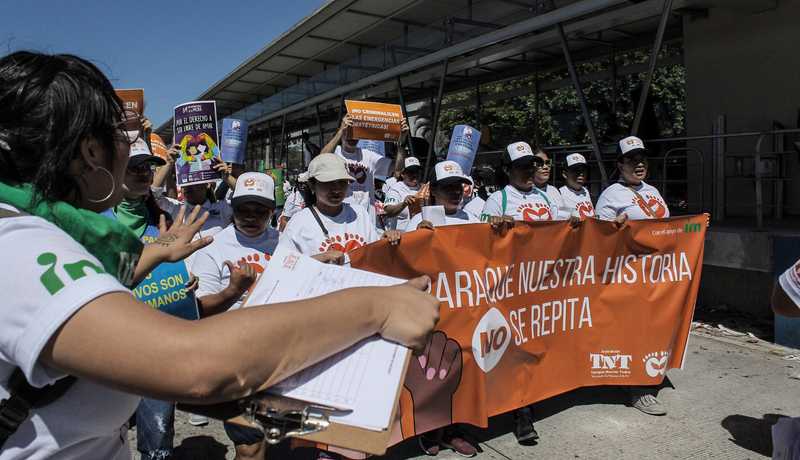
First published in Issue 41 of The Internationalist.
The country studies [Turkey, Egypt, Iran, India, Sri Lanka, South Korea, Vietnam, Japan, China, Philippines and Indonesia], in which we examine the situation of each country in detail, will show that struggles for women’s emancipation were an essential and integral part of national resistance movements. In all these countries, the ‘woman question’ forcefully made its appearance during the early 20th century. The debate on the role and status of women had of course started earlier, but in the era of imperialist and capitalist expansion the question assumed new dimensions; the growth of capitalism changed the old social order and gave birth to new classes and new strata whose women had to pose the old question in a new dynamic. In short the issue was one of democratic rights.
To foreign and local capitalists and landowners, women were the cheapest source of labour for plantations, agriculture and industry. To the colonial authorities and missionaries, local women had to be educated to be good (preferably Christian) wives and mothers to the professional and white-collar personnel who were being trained to man the colonial economy. To the male reformers of the local bourgeoisie, women needed to be adequately Westernized and educated in order to enhance the modern and ‘civilized’ image of their country and of themselves, and to be a good influence on the next generation; the demand grew for ‘civilized housewives’.
The importance of female labour under conditions of capitalist development in Asia has to be stressed. While it is true that women had toiled in the fields and plantations and domestic industries in the pre-capitalist phase, it was with the development of capitalism in a colonial or semi-colonial context, that they were to become available as potentially the largest and cheapest reserve army of labour. Women’s labour was therefore very important to local and foreign capitalists; traditions and practices which restricted women’s mobility or enforced their seclusion were thus detrimental to capitalism in its search for cheap ‘free’ labour. With the growth of industries — especially those associated with the textile trade — the demand for women’s labour grew in all the countries under consideration: China (silk and allied manufactures), Japan (textiles and consumer goods), Iran (carpets), Egypt (cotton), India (textiles) and Turkey (rugs and textiles).
Women’s labour was also crucial in the plantation sector (tea, rubber, coconut, sugar, etc.) and in farm and domestic agriculture in these countries. Moves towards the further ‘emancipation’ of women to enable them to work and to better serve the needs of industrialists, planters and farmers were therefore to be expected. The process of capitalist expansion also created an emerging bourgeoisie which arose partly from the needs of the imperial administration, i.e. local administrators and professionals, and partly from the needs of the new forms of economic organization that served foreign capital. The men of these emerging groups, however, saw the ‘woman question’ in a very different light. While the women of the peasantry and working class were being proletarianized, those of the bourgeoisie were trained to accept new social roles in conformity with the emerging bourgeois ideology of the period. For example, the bureaucrats, missionaries and male reformers of the local bourgeoisie were convinced that women had to be emancipated from the social abuses of a ‘savage’ past, from practices that were defined as repugnant by the prevailing norms of European society. Obvious areas of violence and oppression were high- lighted, such as widow burning in India, veiling, polygamy, concubinage and seclusion in Egypt, Turkey, Korea, Vietnam, Iran and Indonesia, and foot-binding in China. But to these were added other so-called ‘barbaric practices’ that went against the Christian ideas of monogamy and sexual control that Europeans enforced upon their own women. For example, vestiges of matriarchy, tolerant sexual mores, polyandry and divorce by mutual consent, all of which existed in the Kandyan regions of Sri Lanka, were criticized not only by the foreign rulers and missionaries but also by men of the local bourgeoisie. Many of the reformers among the indigenous bourgeoisie were men who saw the social evils of their societies as threats to the stability of bourgeois family life, and who therefore campaigned for reform in order to strengthen the basic structures of society rather than to change them. There was thus an in-built conservative bias in many of the reform movements.
The nature of the resistance movements in these countries and of the feminist struggles within those movements varied with the balance of forces that resulted from capitalist expansion. In most countries, they were dominated by the local bourgeoisie. Again, there were two types: those in which the bourgeoisie found it necessary to mobilize the masses in the struggle, as in India and Indonesia, and others, in which the local bourgeoisie replaced the imperialist rulers through a process of negotiation and gradual reforms as in Sri Lanka or the Philippines. The women’s struggles associated with both types of resistance movements did not move beyond the sphere of limited and selected reforms: equality for women within the legal process, the removal of obviously discriminatory practices, the right to the vote, education and property, and the right of women to enter the professions and politics, etc. These were reforms which had little effect on the daily lives of the masses of women; neither did they address the basic question of women's subordination within the family and in society. Even where women of the working classes were involved, the specific character of the struggles was determined by that of the larger struggle; equal pay and similar demands were usually their main objective.
In a few countries, however, the involvement of peasants and workers in the resistance movements pushed the struggle on to a broader front. Not content with replacing the pre-capitalist or imperialist regimes with a local bourgeoisie, they aimed at a more radical transformation of society, at the establishment of a socialist society, a trend that is illustrated by the country studies of China and Vietnam. The feminist element in these movements was able to become a revolutionary force that simultaneously helped to transform society and to improve the position of women. In this context, examples of revolutionary feminism during the early 20th century provide valuable evidence that feminism was not a diversion, a bourgeois aberration, nor a matter to be considered only after a social revolution; on the contrary, it was a process which had to be continuous and permanent during all stages of the struggle.
Kumari Jayawardena (b. 1931) is a Sri Lankan historian, feminist scholar, and author whose work has explored the intersections of gender, class, and colonialism in the context of South Asia, documenting and analyzing the role of women in shaping societies, Her seminal work Feminism and Nationalism in the Third World (1986) is considered a landmark in feminist literature, critically examining the dynamic relationship between feminism and anti-colonial struggles.
Image: Sri Lankan artist Sujeewa Kumari’s Paint 01 examines notions of social identity and women in a post-colonial context.



